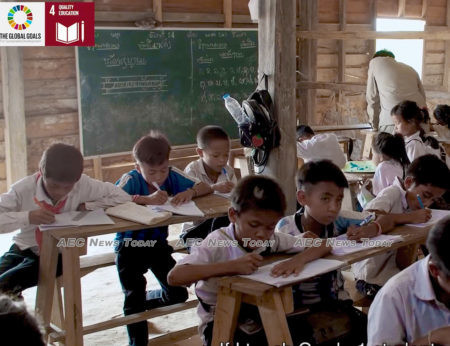“When I grow up, I want to become a soldier to serve my country”, said 10-year-old Ton, talking about his dreams for the future. When he is not in school Ton helps his family in the rice fields and with day-to-day chores such as tending the cows and feeding the pigs. He lives in a one-room house along with his five siblings; he is the only one in the family who has had the opportunity to go to school.
The fundamental human right of access to education is still not available for many children like Ton, with lifelong consequences. Ensuring quality education for all children, including those from low-income families and in rural areas, is fundamental to achieving development goals for countries across the Asia-Pacific.
While education is compulsory and free through to the fifth grade in Lao PDR, access to quality education in the country is limited due to capacity issues. There are shortages of teachers in rural areas, while the remote location of many villages poses a considerable challenge for many students outside of city centres.
Somjai Ladsomphu, a teacher at Baan Kokbok (Kokbok Village) in Savannakhet province, is well familiar with the difficulties caused by inaccessibility to education.
Prior to the building of the new school in Kokbok, the distance to the schoolhouse was a serious barrier for students who were already helping their families to make ends meet, he said, adding that he is aware of many who had to ‘drop out’ from school.
65,000 primary-school aged kids out of school

Lao children who are most likely to be out of school, according to the Lao Expenditure Consumption Survey 2012/2013 (LECS V), are geographically concentrated in a few provinces. Savannakhet has the highest number of out-of-school children.
The Unesco Institute of Statistics data for 2018 shows some 65,377 primary-school aged children in Lao are not in school. Many live in remote areas that do not have schools, or are from poor families who are excluded from education.
A collaboration between the Department of Non-Formal Education of the Lao PDR Ministry of Education and Sports (MoES), Educate A Child, and Unesco Bangkok is helping change that with the implementation of the Primary Education Equivalency Programme (Peep).
Peep focuses on improving access to education for disadvantaged students and strengthens the capacities of teachers.
The initiative has been able to scale up flexible learning strategies covering 15 provinces and more than 79 districts. Between the 2016 and 2019 academic years more than 14,000 out-of-school children have been enrolled and more than 100 teachers trained. Efforts are ongoing to enroll more out-of-school children, prevent student dropouts, and continue teacher training.
While the non-formal education takes place in mixed classrooms, often after regular school has finished, the goals are to educate students to read and write at standards matching those of the formal school system, allowing school-age children to transition.
Mr Ladsomphu acknowledges that it can be challenging teaching a class that has students from multiple grades attending at the same time, requiring him to move back and forth among groups of students teaching grade-appropriate lessons.
Not enough teachers

“There are currently not enough teachers, laments Phonexay Vilasack, head of the Phalanxay District Education and Sport Bureau, adding, “our aim is to recruit more teachers from the formal and non-formal school systems to volunteer”.
A major component of the Peep programme is teacher training, which is focused on a more child-centred pedagogy and multi-grade teaching practices.
Lao PDR is committed to ensuring that all citizens graduate at least upper secondary school by the year 2030.
In moving towards this goal the Lao PDR government is to continue implementing Peep using its own funds.
Announcing the programme Dr Khamphay Sisavanh, MoES vice-minister, said “the project that will help raise the quality of education for those living in remote or hard-to-reach areas.
“The Department of Non-Formal Education plays an important role in identifying children who have dropped out of school, or who have never had a chance to attend”.
Each student who has this new opportunity will potentially have their their lives transformed. For Nam, a classmate of Ton’s in Kokbok Village, her goal is to become both a teacher and a doctor, so that she can look after her parents in the future.
“It is important as a teacher to shape their mind to become a good person and speak well”, Mr Ladsomphu said. “Students who have dreams have told me that only the teacher supports them to achieve their dreams, and encourages them to study, and to become smarter.”
This article was written Wasinee Noppakunthong, a programme assistant in the Non-Formal Education and Literacy section at UNESCO Bangkok.
Originally published as Rural schools in Lao give life to students’ dreams
Feature video Unesco
Related:
- Vietnam-funded school handed over to Laos (Vietnam Plus)
- Vietnam helps Laos develop educational facilities (Vietnam Plus)
- The sad state of Lao’s education system (The Asean Post)
UNESCO also develops educational tools to help people live as global citizens free of hate and intolerance and works so that each child and citizen has access to quality education.
By promoting cultural heritage and the equal dignity of all cultures, Unesco strengthens bonds among nations.
Unesco also fosters scientific programmes and policies as platforms for development and cooperation, and stands up for freedom of expression, as a fundamental right and a key condition for democracy and development.
Latest posts by Unesco (see all)
- Rural schools in Laos give life to students’ dreams (video) – November 29, 2019

